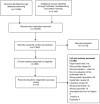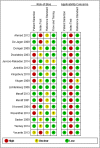A systematic review of the diagnostic accuracy of automated tests for cognitive impairment
- PMID: 29356098
- PMCID: PMC5887872
- DOI: 10.1002/gps.4852
A systematic review of the diagnostic accuracy of automated tests for cognitive impairment
Abstract
Objective: The aim of this review is to determine whether automated computerised tests accurately identify patients with progressive cognitive impairment and, if so, to investigate their role in monitoring disease progression and/or response to treatment.
Methods: Six electronic databases (Medline, Embase, Cochrane, Institute for Scientific Information, PsycINFO, and ProQuest) were searched from January 2005 to August 2015 to identify papers for inclusion. Studies assessing the diagnostic accuracy of automated computerised tests for mild cognitive impairment (MCI) and early dementia against a reference standard were included. Where possible, sensitivity, specificity, positive predictive value, negative predictive value, and likelihood ratios were calculated. The Quality Assessment of Diagnostic Accuracy Studies tool was used to assess risk of bias.
Results: Sixteen studies assessing 11 diagnostic tools for MCI and early dementia were included. No studies were eligible for inclusion in the review of tools for monitoring progressive disease and response to treatment. The overall quality of the studies was good. However, the wide range of tests assessed and the non-standardised reporting of diagnostic accuracy outcomes meant that statistical analysis was not possible.
Conclusion: Some tests have shown promising results for identifying MCI and early dementia. However, concerns over small sample sizes, lack of replicability of studies, and lack of evidence available make it difficult to make recommendations on the clinical use of the computerised tests for diagnosing, monitoring progression, and treatment response for MCI and early dementia. Research is required to establish stable cut-off points for automated computerised tests used to diagnose patients with MCI or early dementia.
Keywords: Alzheimer disease; MCI; ageing; automated tests; computerised tests; dementia; diagnosis; monitoring.
© 2018 The Authors. International Journal of Geriatric Psychiatry Published by John Wiley & Sons Ltd.
Figures
References
-
- Prince M, Bryce R, Albanese E, Wimo A, Ribeiro W, Ferri CP. The global prevalence of dementia: a systematic review and meta‐analysis. Alzheimers Dement. 2013;9(1):63‐75. e62 - PubMed
-
- World Health Organization . International Classification of Disease—classification of diseases, functioning, and disability. 2010; http://www.who.int/classifications/icd/en/. Accessed: 16.07.2015
-
- O'Neill D, Barber RD. Reversible dementia caused by vitamin B12 deficiency. J Am Geriatr Soc. 1993;41(2):192‐193. - PubMed
-
- Meador KJ. Cognitive side effects of medications. Neurol Clin. 1998;16(1):141‐155. - PubMed
-
- Muangpaisan W, Petcharat C, Srinonprasert V. Prevalence of potentially reversible conditions in dementia and mild cognitive impairment in a geriatric clinic. Geriatr Gerontol Int. 2012;12(1):59‐64. - PubMed
Publication types
MeSH terms
Grants and funding
LinkOut - more resources
Full Text Sources
Other Literature Sources
Medical
Molecular Biology Databases



